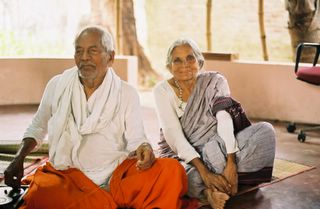All I wanted was a banana
"They have given me 20 bedsheets. I now have enough bedsheets to last me all through this lifetime and into the next. And six blankets! It is much too hot here for blankets."
We discovered she was standing in line to receive her third set of stainless steel cookware. We assumed, of course, she would be trying to sell most of the extra "relief" materials.
"All I really wanted was a banana," she told us.
Across the road, they are building temporary shelters. All laid out in rows, one meter between each "house". Each unit is 8 feet by 8 feet, and covered in black polyvinyl chloride sheets. No windows. Dirt floor. Stinking of chemicals. When the temperature outside reaches 105 degrees in May, inside the temperature will reach 125 degrees. We are sure they will be abandoned long before then.
The fisherfolk didn’t ask for shelters. They asked for fishing nets. Or even the material for making fishing nets. But none seem to be on the way.
No one asked the fisherfolk about the design of the "houses" either. There is too much money at stake. Government officials told us that contractors were receiving 8,000 rupees (roughly $200 per house.) Two weeks ago, Krishnammal built a large mess hall, approximately 65 feet by 40 feet, with a tall peaked roof, covered in thatch, with a low, cement foundation, cool and inviting, for 15,000 rupees. There is profit to be made.
We see babies with sanitary napkins being used as diapers. Apparently, another aid agency came in and distributed sanitary napkins, not recognizing that Indian village women do not use them. Actually, I give the aid agency two points for thinking about this need. But they lose two points for never having asked whether they are in fact used.
I learned secondhand that there is a watertank truck trolling the streets of Nagapattinam. Printed on the side in small letters with a small red cross is ICRC (International Committee of the Red Cross). In large letters covering most of the truck is "CocaCola". Apparently, Coke sees the tsunami as an advertising opportunity. None of the folks I spoke with, though, ever saw the tank dispense any water (which is largely supplied by UNICEF).
Sai Baba has sent a relief team with a lot of money behind it, his followers resplendent in bright yellow clothing and hats, with deep red scarves. Also the Church of Scientology, also in bright yellow.
The NGOs (non-governmental organizations) have not been immune from their share of charlatans either. There is one man, a would-be yogi from north India, who seems to have managed to have himself named chair of the "local industries relief committee." He has no organization, no projects, and no funding, but speaks a very precise Indian English, and spends most of the day on his cellphone. From what we can tell, he has never done an honest day’s labor in his life. But he seems to have at least some of the foreign NGOs bamboozled, and he is about as close "local participation in planning" as they are likely to get. .
Of course, the NGOs will be gone pretty soon, if they aren’t already, and before I take them to task for this, I should justly note that Aliyah and I will be as well.
Krishnammal rightly emphasizes that all are still in a state of shock – the affected people, yes, but also the government, relief organizations, and all those who have depended on the coastal areas for their livelihoods, and those who will never be able to bury (or cremate) their dead. "We are in graveyard mode," she says, "The time will come when we will act, but not yet," rebuffing Medha Patker’s appeal that LAFTI provide a more visual (and visceral) presence at the innumerable meetings. "The defects in government relief plans and the participation of the NGOs are not the big issues," she says, "The big issues are that people need food, they need work, and they need permanent houses, and I plan to provide all three."
Amma tells me that the first 100 enlistees in the "army of compassion" are coming to Vinoba Ashram tomorrow. I am supposed to speak to them (after a meal, I presume), and my Tamil isn’t anywhere close to being up to the task, a fact on which I play by blaming my mother for my lack of linguistic skill. I will make her repay for her failings by having her translate for me.
Today is the first day of Pongal. The ashram is almost totally empty, with workers gone off to join their families. The blind Muslim man comes by with his five-year-old niece, who wants to meet the foreigners. I hear a cricket game on the street in the distance, and maybe volleyball as well. Krishnammal presented most of the male workers with new shirts (it is traditional to give gifts of cloth on the first day of the four-day holiday.)
Aliyah and I have received very precious gifts as well, a gift of white cotton cloth spun by Jagannathan himself. Aliyah’s was made into a churi dal, a long slender Indian shirt with slits on the sides, usually worn over pajama pants (though Aliyah is planning on petticoats from the "Maharani Krishnammal Petticoat Production Unit." Sathya, who has come down from Chengelput, has strung a hundred purple and white flowers together, which Aliyah is now wearing in her hair. For me, a shirt in the traditional Tamil style. It will immediately become one of my most prized possessions


0 Comments:
Post a Comment
<< Home